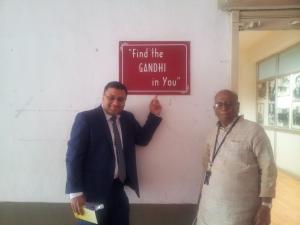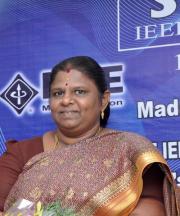 For some time, the College of Engineering and Computer Science has been expanding its horizons to encompass more and more international activities and partnerships. In 2012, for instance, Dean S. K. Ramesh and C. T. Lin, professor of mechanical engineering, traveled to Austria for the International Conference on Computers Helping People with Special Needs. In 2013, Ramesh and Lin organized a conference on assistive technology in India, and a delegation from Korea Nazarene University visited the college.
For some time, the College of Engineering and Computer Science has been expanding its horizons to encompass more and more international activities and partnerships. In 2012, for instance, Dean S. K. Ramesh and C. T. Lin, professor of mechanical engineering, traveled to Austria for the International Conference on Computers Helping People with Special Needs. In 2013, Ramesh and Lin organized a conference on assistive technology in India, and a delegation from Korea Nazarene University visited the college.
In 2014, the drive for international collaborations gained new momentum, thanks in large part to a memorandum of understanding between CSUN and Kumaraguru College of Technology (KCT) in Coimbatore, India, and the activities of Shereazad Jimmy Gandhi, assistant professor of engineering management and director of CSUN’s Ernie Schaeffer Center for Innovation and Entrepreneurship. On February 13, Ramalatha Marimuthu, professor and head of the information technology department at KCT, spent a full day at CSUN, visiting labs, talking with department chairs and meeting with Emil Henry, manager of technical services and information systems in the college.
 “It was a great experience for me,” she says. “It gave me a plan for how to go about bringing the KCT labs up to the standards of international universities and CSUN.”
“It was a great experience for me,” she says. “It gave me a plan for how to go about bringing the KCT labs up to the standards of international universities and CSUN.”
She also gave a talk titled “Assistive Technology— Giving Back to Society by Raising a Socially Responsible Engineer.”
“Anyone can do a project in assistive technology,” she says, explaining why, as a computer scientist, she is interested in the field. “About 14 years back, I encountered a disability. That inspired me to use technology to help people.”
In India, where nearly 5% of the population has special needs and about 75% of those are unable to afford medical help or assistive devices, she has been encouraging her students to pursue projects that use embedded systems and Android applications to help the visually impaired, autistic, dyslexic and paraplegic in a costeffective way. Her presentation covered those projects, including a screening system for autism, a gait-correcting mat for children with balance or gait problems and a device for correcting drop foot, a disorder where the nerves are impaired and there is no sense in the foot, as well as others in progress.
Following her talk, she met with Gandhi, which spurred further collaboration between the two institutions. Gandhi visited KCT in August and gave a talk on innovation and entrepreneurship to a full house of about 100 students and faculty. He joined the IT department’s advisory board and also helped KCT develop a oneunit elective on innovation and entrepreneurship. The course will be taught over two days in January, and students will be assigned a project. Gandhi will assist them online, returning in April to evaluate the projects and present certificates to the participants. In addition, KCT will be taking part in an international research effort that Gandhi is leading to evaluate how innovation and entrepreneurship take place in different countries, with a special focus on the United States, India, China, Japan, Germany and Brazil. Other participants so far include Purdue University, the Technical University of Ingolstadt in Germany and Tokyo Institute of Technology in Japan. Gandhi’s aim is to study how innovation and entrepreneurship are practiced in different countries and to explore some of the reasons for these differences.
“Acceptance of risk and failure will likely be a factor, as well as cultural factors,” he says.
Gandhi has also been working with industry, visiting Toyota in 2013 to understand how the company assures quality and later incorporating what he learned into his quality management class. In April 2014, during a trip to Germany, he visited Audi and BMW. BMW is interested in evaluating various automotive innovations in 2025, and as a first step, the company sent four people to CSUN on July 14-17. They particularly wanted to talk with people in different industries, to understand different perspectives on innovation, so Gandhi took them to various Southern California companies with which CECS has a relationship. And in November a group of students from Germany came to CSUN for a series of international sourcing and entrepreneurship seminars.
With these activities, the college is laying the groundwork for additional dynamic and mutually beneficial partnerships. These partnerships, in turn, promise to yield new insights into the nature and possibilities of innovation and entrepreneurship, increasing the knowledge base and the opportunities for CECS faculty, students and industry partners.

Subscribe to this post's comments feed